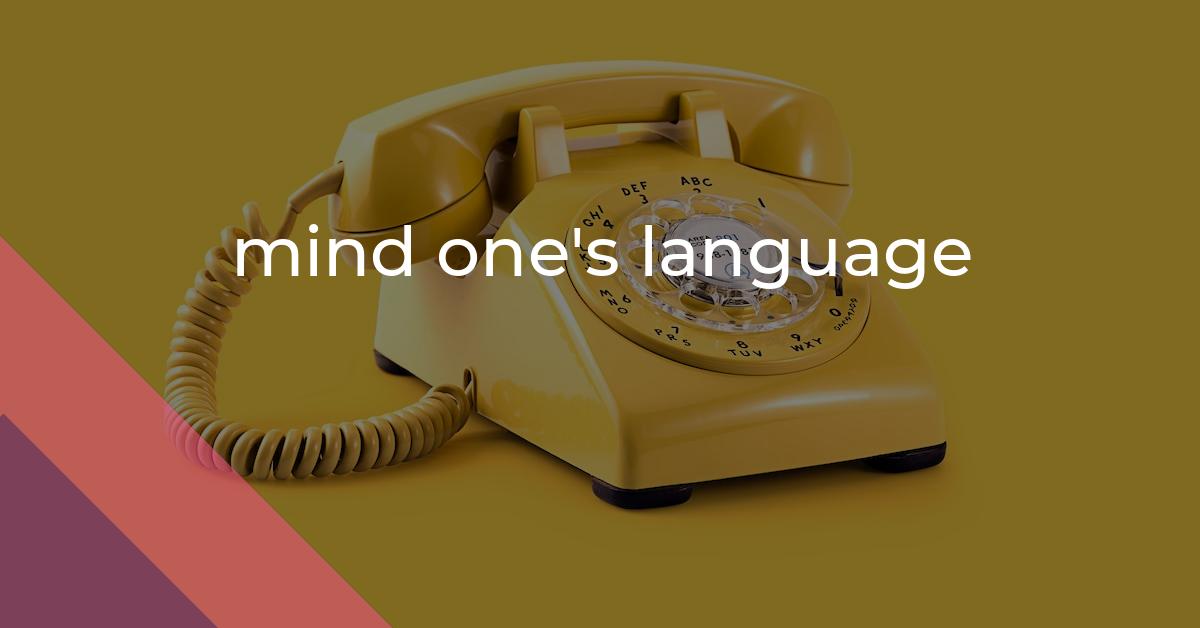mind one’s language: Idiom Meaning and Origin
What does ‘mind one's language’ mean?
The idiom "mind one's language" means to be cautious and careful with one's choice of words and to avoid using offensive or inappropriate language.

Idiom Explorer
The idiom "watch one's language" means to be careful about the words one uses, especially in order to avoid saying something offensive or inappropriate.
The idiom "politically correct" refers to language, actions, or policies that are deliberately chosen to avoid offending or excluding particular groups of people, particularly those relating to gender, race, or ethnicity.
The idiom "open one's mouth" means to start speaking or expressing an opinion. It implies breaking silence or sharing thoughts.
The idiom "my word" is often used to emphasize that what someone is saying is true or reliable, emphasizing their trustworthiness and integrity.
The idiom "mum's the word" means to keep quiet or not reveal information, often because it is a secret or should not be shared. It implies the need for confidentiality or silence in a situation.
The idiom "move on" means to leave a situation or past event behind and continue with one's life or focus on something else.
The idiom "mouth the words" means to silently or mimically articulate words without actually saying them out loud. It commonly refers to situations where someone is pretending to speak or is unable to vocalize their thoughts.
The idiom "mouthful of marbles" refers to a person's speech that is difficult to understand or muffled, often due to a strong accent or slurred words.
The idiom "mind how you go" is a polite way to say "be careful" or "take care" when someone is leaving or going on a journey.
The idiom "mince words" means to choose one's words carefully or to speak without directness, often to avoid causing offense or to soften the impact of what is being said.
The Power of Verbal Restraint
The idiom "watch one's language" is another phrase commonly used to advise someone to be careful about what they say or how they express themselves. Similar to "mind one's language," this idiom emphasizes the importance of being mindful of the words and phrases one uses, particularly in situations where it is crucial to maintain politeness, respect, or avoid causing offense or misunderstandings.
The idiom "watch one's language" suggests that individuals should exercise caution when choosing their words, paying attention to the impact they may have on others. It highlights the need to be aware of the language one uses, ensuring that it aligns with societal norms and expectations. This idiom acknowledges that words have power and recognizes the importance of being mindful of their impact.
The idiom "mince words" is a phrase that is often used in relation to "mind one's language." It means to speak or express oneself in a direct, straightforward manner without trying to soften the impact or avoid being truthful. This idiom is sometimes used to encourage individuals to be honest and clear in their communication, without using excessive or unnecessary words.
When someone is told to "mind how you go," it is a reminder for them to be cautious and careful in their actions, including their language. This phrase suggests that individuals should pay attention to their words and their overall behavior as they navigate through different situations or engage in conversation. It emphasizes the importance of being mindful and considerate in one's behavior.
"politically correct" is a term commonly used in contemporary discourse to refer to language or actions that are careful not to offend or marginalized groups of people. This concept is closely related to the idea of "mind one's language" as it emphasizes the importance of choosing words and phrases that are inclusive and respectful. Being politically correct involves being mindful of how certain language or expressions may perpetuate stereotypes or biases.
Overall, these idioms, including "watch one's language," "mince words," "mind how you go," and "politically correct," all reinforce the importance of being careful and considerate in one's language. They remind individuals to be aware of the impact their words may have on others, to be honest and direct in their communication, to be cautious in their actions, and to be inclusive and respectful in their language.
Example usage
Examples of how the idiom "mind one's language" can be used in sentences:
1. She needed to mind her language when speaking to her boss to avoid getting in trouble.
2. The teacher told the students to mind their language and refrain from using offensive words.
3. It is important to mind your language when speaking in a formal setting like an interview.
More "Etiquette" idioms



